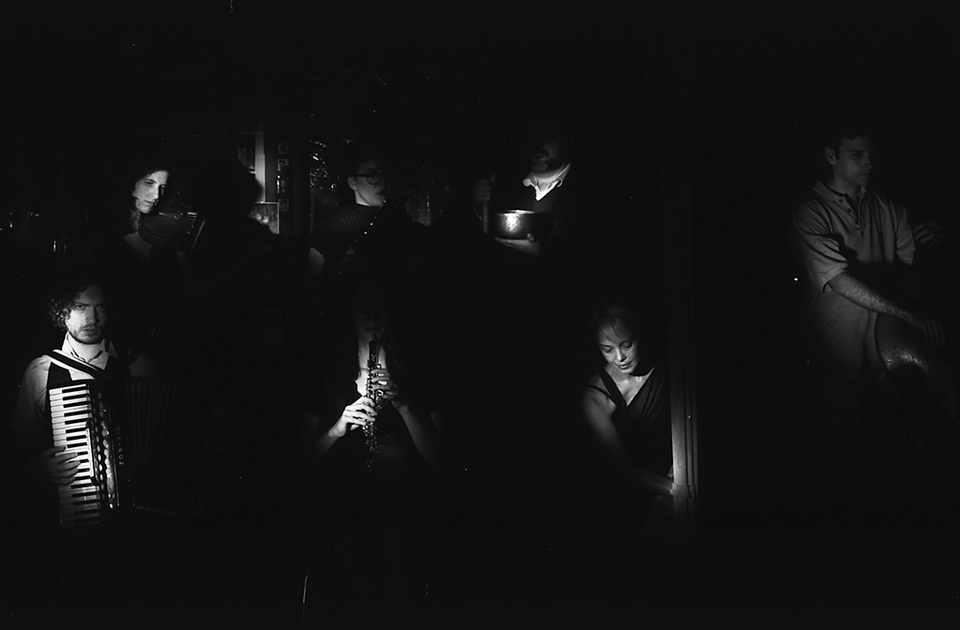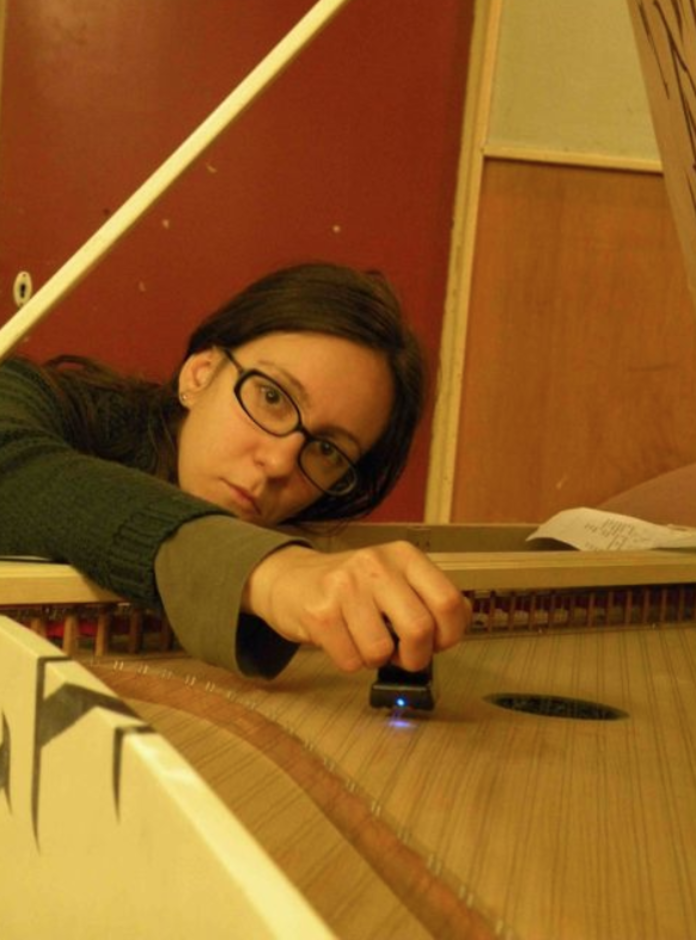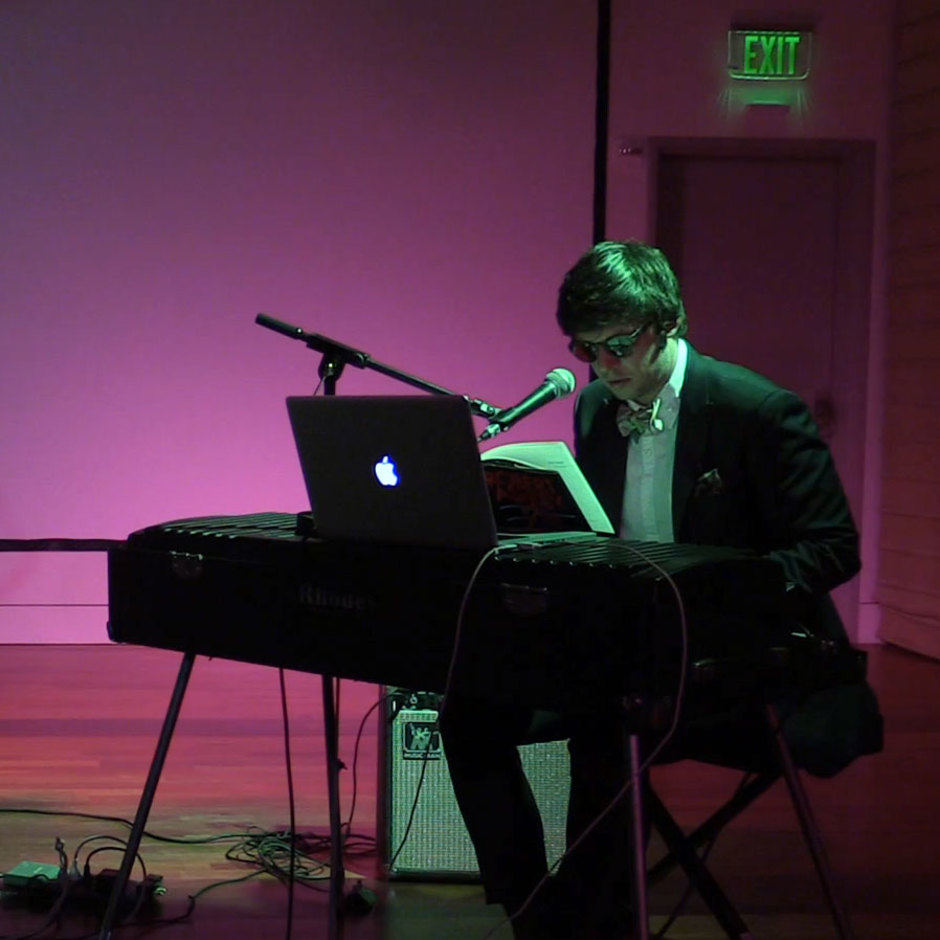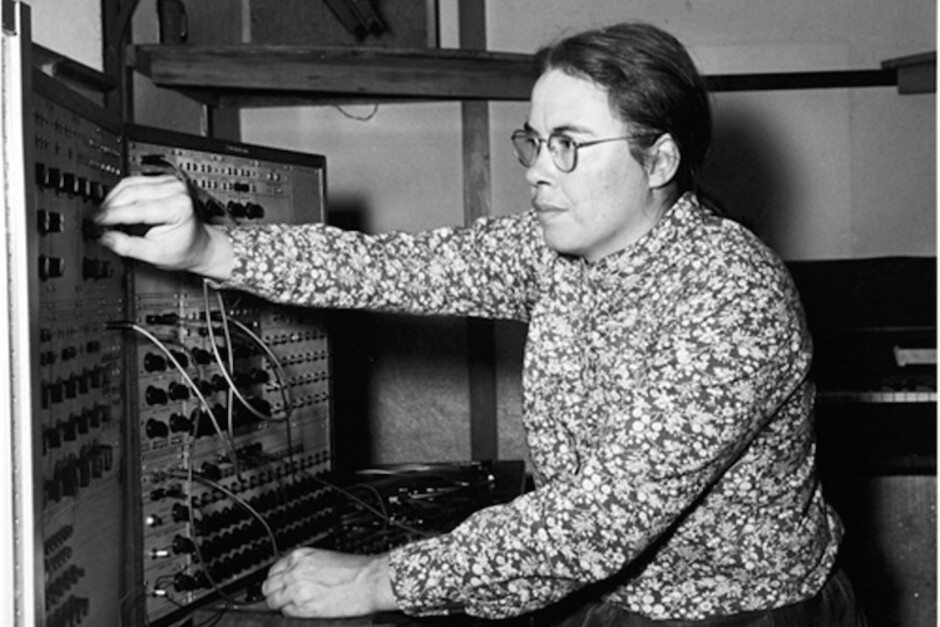
Ghost Ensemble
Teodora Stepančić:
Harp n Ropes (No. 4)

Teodora Stepančić is composer, pianist and curator. In recent years, Teodora has been collecting works for the piano and different ensemble formations that speak in the voice of the outsider, a hushed voice, that does not try to draw attention to itself, that stresses generosity, attentiveness, intimacy, spirit and focus. She is interested finding different ways of presenting, performing and creating music and tries to create an atmosphere that invites for intimate listening and experience, a space for sharing sounds, ideas and music. Teodora curates, organizes and performs concerts in Europe, USA, Middle East and Argentina. She is currently presenting second season of Piano+ concert series at Spectrum, Brooklyn. In her compositions Teodora explores different ways of incorporating theatrical and visual elements into music performance, cyclical and game-based musical forms, and developing works in close collaboration with individual performers.
Andrew C. Smith:
We remember not the word, but the sound of the word

Language is an activity where we repeat ourselves and others — a negotiation of similarity and difference of sounds, giving us similarity and difference of meaning. It is the network of repetition among voices that allows us to communicate. This piece is a repetitive text which I wrote, recorded, and transcribed using custom software to translate each vowel and consonant into musical notation. Closing each section is the phrase “we remember not the word, but the sound of the word.” The similarity is in the gesture, but the difference is in the sound. — ACS
Andrew C. Smith is a composer and keyboardist living in Santa Cruz, California. His music often involves just intonation tunings, repetition, and language at the threshold of making sense. In addition to his work with language, he uses computers in his everyday artistic practice, often using electronic means to manipulate sound and text, using the results of these manipulations in his work.
He has been producing concerts and recordings since 2011, and is currently the Executive Director of Indexical, a nonprofit organization based in Santa Cruz, California. He has previously produced events at Carnegie Hall, Lincoln Center (Alice Tully Hall), Bohemian National Hall, and other venues as Managing Director of the S.E.M. Ensemble (Brooklyn, NY), and has worked for the Seattle Symphony (Seattle, WA) and Issue Project Room (Brooklyn, NY).
His music has been performed by sfSound, String Noise, Guidonian Hand Trombone Quartet, Séverine Ballon, Ostravaská banda, and S.E.M. Ensemble. He studied English and music composition at Willamette University and Trinity College Dublin.
Sky Macklay:
60 Degree Mirrors
A kaleidoscope contains five mirrors angled sixty degrees from one another. The reflections create subtly shifting repetitive-yet-distinct geometric-mosaic patterns, multiplying and beautifying whatever objects (beads, jewels, pebbles, glass shards) live within the kaleidoscope.
My piece 60 Degree Mirrors uses a series of oboe and flute multiphonics as the sonic “objects” within the kaleidoscope. I manipulate them into geometric patterns and dense textures. Oboe and flute objects are multiplied, expanded, and fractured by the other instruments to create a saturating web of sound.
– Sky Macklay
Liisa Hirsch:
Imprint
Estonian composer Liisa Hirsch takes microscopic sounds and amplifies the little moment-to-moment differences. Her new work Imprint requires the full ensemble to coordinate their playing through breathing and listening — with no conductor, and no central authority — which centers the experience of listening in the moment and reacting to fellow musicians. — ACS
Pauline Oliveros:
Angels & Demons

Ben Richter:
Wind People
What else seems as free as the wind? As powerful, as gentle? As transient, as eternal? If we listen to the wind, as to the unheard corners of the world, and beyond it — oceans, volcanoes, plate tectonics, planetary magnetic fields — the sound-world that emerges shows the cosmic beauty of flux: every phenomenon, from the movement of the wind to that of continents, is constantly changing, flowing, blending together, whether visible or invisible to our current perception of time.
Through Wind People I hope to draw a sense of peace and comfort from our smallness, transience, and fragility in the face of an overwhelming immensity, the music mirroring the constant ebb and flow visible when zooming in or out to quantum or geological time. — B.R.
Ben Richter is a composer, accordionist, and director of Ghost Ensemble. In his music, sound worlds of constant transformation emerge from shifting timbre gradients and microtonal fluctuations, exploring alternative modes of time perception. Wind People, “a massive drone of lapidary detail” that “thrums, throbs, and glides with surging and ebbing density” (Peter Margasak, Bandcamp Daily), was featured on Ghost Ensemble’s LP We Who Walk Again (2018, Indexical). As an accordionist, Ben has explored the microtonal potential of the instrument through collaborations with Pauline Oliveros and Phill Niblock; his immersive just-intonation accordion album Panthalassa: Dream Music of the Once and Future Ocean (2017, Infrequent Seams) was hailed by Stephen Smoliar as “likely to offer a profound impact on the very nature of listening.”
Since its founding in 2012, Ghost Ensemble has dedicated itself to long-term study of experimental music with a focus on new perceptual perspectives that explore the experience of listening. The group has extensively explored the Deep Listening philosophy of Pauline Oliveros, collaborating with the composer to inaugurate the release of her Anthology of Text Scores at Eyebeam in 2013, and has previously premiered new works written for the ensemble by John Rot, Leonie Roessler, Kyle Gann, Lucie Vítkova, Sky Macklay, and Somna M Bulist. Ghost Ensemble’s performance techniques realize fragile, liminal sounds, produced by virtuosic performers who are experts on their instruments. These practices can only be realized through long-term collaborations between composers and performers. Tax-deductible donations to Ghost Ensemble’s commissioning project support a crucial stage of this long-term relationship between composers and performers, and help to shape its future.

Andrew C. Smith is a composer and keyboardist living in Santa Cruz, California. His music often involves just intonation tunings, repetition, and language at the threshold of making sense. In addition to his work with language, he uses computers in his everyday artistic practice, often using electronic means to manipulate sound and text, using the results of these manipulations in his work.
He has been producing concerts and recordings since 2011, and is currently the Executive Director of Indexical, a nonprofit organization based in Santa Cruz, California. He has previously produced events at Carnegie Hall, Lincoln Center (Alice Tully Hall), Bohemian National Hall, and other venues as Managing Director of the S.E.M. Ensemble (Brooklyn, NY), and has worked for the Seattle Symphony (Seattle, WA) and Issue Project Room (Brooklyn, NY).
His music has been performed by sfSound, String Noise, Guidonian Hand Trombone Quartet, Séverine Ballon, Ostravaská banda, and S.E.M. Ensemble. He studied English and music composition at Willamette University and Trinity College Dublin.
